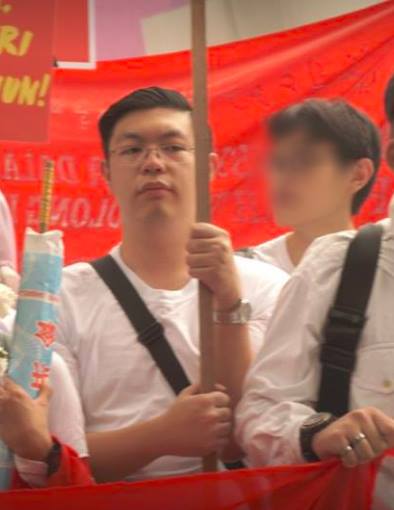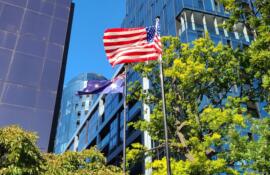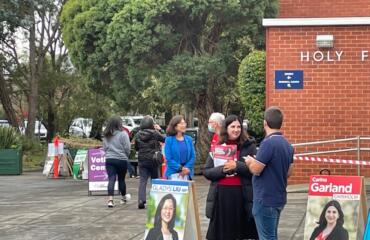
People queue outside a polling station during the 14th general elections in Pekan on May 9, 2018. PHOTO: MOHD RASFAN/AFP/Getty Images
IN November 2016, Melbourne University students Chong Yoong Wai and Wong Guan Jie headed to Federation Square for a rally against Malaysia’s ruling coalition. The two are members of Malaysian Progressives in Australia, a Malaysian-Australian student group that helped organise the demonstration in sympathy with a nationwide protest back home.
The protest, known as Bersih 5.0, Bersih being the Coalition for Clean and Fair Elections, was accusing the Malaysian government of restricting media freedoms and rigging the electoral system in its favour. On the eve of the rally, leading Bersih organisers were arrested in Kuala Lumpur.
While Malaysian communities in cities around the world were taking to the streets in solidarity, Mr Chong and Mr Wong knew attending the protest carried risks. Only two days earlier an ominous email was sent from the Malaysian Civil Service, JPA, to its scholarship students at universities overseas. The students were warned that attending the Bersih rally constituted a seditious act that would violate their “responsibilities as a JPA-sponsored student”, which included “discipline (and) character”.

At Federation Square the pair found themselves among some 2000 activists, chanting slogans denouncing the ruling Barisan Nasional coalition. Fearing government retribution, many protestors wore masks.
As Mr Chong tells it, that was probably a prudent measure because at some point during the rally two men in the crowd caught their attention. “They were shuffling through the crowd without chanting,” he recalls.
“One man was holding a camera that was always pointed at the faces of the attendants rather than the speakers. The second was directing the cameraman.”
The second man was “going in and out of the crowd”, and appeared to be reporting back to someone, Mr Chong says.
In this, and other similar incidents, the two men see the sinister hand of Malaysia’s intelligence agency— Special Branch.
The agency, modelled on the British Special Branch and trained by them during the 1948-1960 Malayan Emergency, the pre-independence guerrilla war, was instrumental in the trial of former deputy prime minister, Anwar Ibrahim. Ibrahim has been twice jailed for sodomy charges, which international human rights groups and foreign governments have condemned as politically motivated.
In recent years, concerns regarding foreign governments surveilling international students have centred on China, specifically the Chinese Students and Scholars Association, the official organisation for overseas Chinese students. The accounts of a defected diplomat and a former spy allege the Chinese Communist party has built networks of student spies within Australian institutions, granting them scholarships in return for monitoring and disrupting Chinese diaspora from joining dissident movements such as the Falun Gong and pro-democracy organisations.
Last year, a Fairfax/ABC Four Corners expose ignited debate over the significance of Chinese interference in Australia. Former Australian Secretary of Defence Dennis Richardson remarked that: “It would be wrong to suggest that the Chinese Government are the worst offenders. It would be wrong to suggest that they are the first ones to have done it.”
In the case of Malaysia, Professor James Chin, director of the Asia Institute Tasmania at the University of Tasmania and critic of the Malaysian ruling-party Barisan Nasional, says the country’s intelligence agency has long operated against students studying overseas.
The surveillance, “has been happening since the 1980s” Chin tells The Citizen. Special Branch works “either undercover or out in the open. The bulk of activities do not happen in Australia, they happen in North America and the UK”.
Special Branch’s main targets are Malaysian students on the JPA and MARA Scholarship, a government scholarship reserved for ethnic Malays, Dr Chin says.
“They are worried that if these students return to Malaysia sympathetic to the opposition they will be a threat. Because of their superior educations they could wield influence in their local communities and encourage others to be sympathetic to opposition parties.”

The Malaysian Consul General in Melbourne, Westmoreland Palon, rejects the students’ allegations around possible surveillance. He said he attended the Federation Square protest and spoke to those attending. “There were a lot of people with cameras. We are not a big brother organisation.
“And it’s a public event. Why would they attend if they don’t want to be seen in public? They get to freely express their views and other members of the public get to freely observe them.”
Mr Palon said he doubted Special Branch operated in Australia. “Even if they did, they wouldn’t tell me.”
The Malaysian High Commission did not respond to questions about Special Branch’s alleged activities here.
Mr Wong and Mr Chong believe they encountered Special Branch on a further two occasions after the Bersih rally. The first was a week later at a vigil, also held at Federation Square, for the Bersih organisers detained in Kuala Lumpur. The students claim they saw the same men filming the crowd once again.
The second alleged encounter was in March last year at an RMIT forum on Malaysia’s controversial, long-term economic plan, TN50, which envisages privatising government services. The forum was hosted by student club Kelab-UMNO, supporters of the ethnic Malay faction in the ruling coalition, Barisan Nasional.
At the forum, the government’s Youth Information Chief, Punithan Paramsiven, asked students for their thoughts on the economic plan.
According to Mr Chong, “the two from the rally were there again”.
They overtly filmed anyone who criticised the government. They left the building at one stage to speak to two other men on the sidewalk. We could not hear what they were saying because we saw them from indoors. At the end of the meeting they took a group photo with Mr Punithan, but the two cameramen refused to be in it.
“Part of our confidence that they were spies is that after the vigil (at Federation Square) we invited them to dinner with us and prodded them with questions about where they were from and how they knew each other,” Mr Chong said.
“They provided dubious accounts like meeting each other while studying in Paris but provided completely different answers when asked the same questions at the TN50 forum by different members of Malaysian Progressive in Australia.”
The anecdote comes as no surprise to Clare Rewcastle Brown, a London-based investigative journalist who is facing an arrest warrant in Malaysia since she made international headlines after publishing evidence and allegations on her blog Sarawak Report claiming that Prime Minister Najib Razak embezzled around $700m from a state development fund. Brown was granted police protection after Malaysian officials stalked and photographed her in a London park.
“There is no doubting in anyone’s mind, certainly Malaysians themselves, that (Special Branch) make it their business to attend these events and try and find who went,” she tells The Citizen in an email.
“They often openly intimidate by filming. It is effective for example in deterring students who have been regularly told that they risk their grants if they attend opposition rallies abroad.”
Dr Chin agrees Special Branch’s surveillance and coercion is immoral and pervasive. But he does not believe Malaysia’s situation is comparable to China’s meddling.
“The big difference between China and Malaysia’s operations in Australia is that Malaysia is only infiltrating Malaysian students and particularly government-sponsored students. China are trying to influence Australian politics and society rather than just keep an eye on these groups so that they do not become sympathetic to opposition parties.”
Moreover, Malaysia does not hold the same financial leverage over Australia that China does. China accounted for 80 per cent of all foreign donations to Liberal and Labor electoral campaigns between 2000-2016. International students, Australia’s third largest export, average 17.5 per cent of universities’ revenue. China’s 160,000 students comprise 29 per cent of international students whereas Malaysia’s 22,000 students are only 4 per cent.
And yet at the same time that overseas scholars were warned against attending the Bersih rally in Melbourne, Curtin and Monash University’s Malaysian Branches issued warnings to students studying in Malaysia not to attend the rallies there. An email from Monash University Registrar’s Susheela Nair advised that any student found participating “in any illegal gathering” or related activity, “or who is arrested by authorities for doing so,” may be subjected to “disciplinary proceedings.” After a backlash—including accusations the university was bending to government pressure— Monash apologised for the email’s wording, insisting it “did not properly convey the intent of the message”.
Last month Malaysian Prime Minister Najib Razak dissolved the Malaysian parliament and called elections today, for May 9. The opposition parties and Bersih movement have accused the Prime Minister of ambushing his rivals and stacking the odds, holding the election on a weekday to reduce voter turnout and electoral gerrymandering.
Ahead of today’s poll, Malaysian dissidents overseas have been mobilising once again – Mr Wong and Mr Chong among them.
While the pair are cautious of feeding xenophobic fears about Australian sovereignty being compromised by foreign spies and lobbyists, they also argue that international students deserve the same political freedoms as their domestic classmates.
“We have common cause with Australians who are against the surveillance and suppression of oppressed groups and their popular movements. The struggle for clean and accountable government is a global one.”


